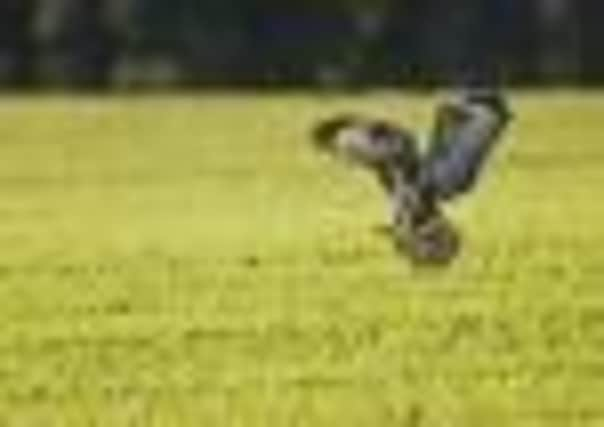Shooters’ enemies to be caged


The experiment, funded by Defra, is a response to complaints from the game shooting business.
The National Gamekeepers Organisation and the Country Land & Business Association will sit on an advisory body set up to consider the results.
Advertisement
Hide AdAdvertisement
Hide AdThe RSPB said it was “stunned” by the idea of imprisoning buzzards and predicted: “This intervention against one of England’s best-loved birds of prey will set a terrible precedent.”
The RSPB said buzzards usually scavenged dead meat. They would sometimes take young pheasants but probably no more than one or two per cent of the 40 million released every year. The financial cost of that to a shoot releasing a thousand poults a year would be about £30.
The pheasants were non-native birds, the RSPB pointed out, only kept common by artificial intervention.
However, the buzzard was eradicated from large swathes of Britain by persecution based on the firm belief of gamekeepers that they are damaging.
Advertisement
Hide AdAdvertisement
Hide AdLately, thanks to legal protection and what the RSPB calls “a general warming of attitudes towards birds of prey”, they have made a remarkable recovery and have become a common sight in Yorkshire, where they were rarely seen a few years ago. A report in 2010 said the breeding population had increased 146 per cent since 1995.
In preamble to its invitation for bids to run a control project, Defra said: “A 2011 survey by the National Gamekeepers Organisation found 76 per cent of gamekeepers believed buzzards have a harmful effect. In one case it is claimed 25-30 per cent of pheasant poults were lost to buzzards.
“Buzzards respond to local variations in prey populations. It is claimed that individuals may target pheasant release pens if they learn they can find a readily available food supply at them.”
Defra said its Natural England arm had been asked for licences to cull buzzards but was against that. Instead it would spend £375,000 on experiments over six shoots in Northumberland, leading to a report in October 2015.
Advertisement
Hide AdAdvertisement
Hide AdTechniques to be tried would include providing cover for the poults, diversionary feeding, nest destruction and “permanent removal off-site, for example to a falconry centre”.
Amanda Miller, the RSPB’s conservation manager for Northern England, said: “We are shocked by Defra’s plans to destroy buzzard nests and to take buzzards into captivity to protect a non-native game bird released in its millions. Buzzards play a minor role in pheasant losses compared with other factors like collisions with vehicles.
“There are options for addressing the relatively small number of pheasant poults lost to buzzards. Destroying nests is completely unjustified and catching and removing buzzards is unlikely to reduce predation levels, as another buzzard will quickly take its place. Both techniques would be illegal under current wildlife laws, and I think most people will agree with us that reaching for primitive measures, such as imprisoning buzzards or destroying their nests, when wildlife and economic interests collide, is totally unacceptable.
“I can think of better ways of spending £400,000 of public funds.”
Advertisement
Hide AdAdvertisement
Hide AdCLA policy director Christopher Price said: “Shooting makes a significant contribution to Yorkshire’s rural economy and supports the livelihoods of many people. Defra is right to be considering options to resolve the conflict.
“The RSPB’s views may or may not be borne out but improving our knowledge of the situation has to be the most sensible way forward.”
Do other birds also suffer?
BEDALE farmer Mark Sampson, secretary of the Yorkshire Farming & Wildlife Organisation, said the RSPB was inclined to under-estimate the impact of predators.
He commented: “There has been a great push on to increase grey partridge numbers, with the threat that all partridge shooting will be stopped if it does not succeed.
“And buzzards certainly do not help. They are great big terrifying birds and what they do not eat, they frighten away.”